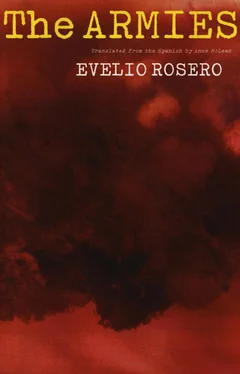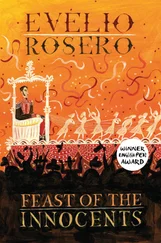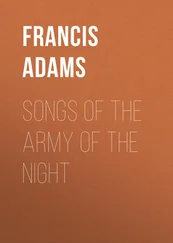I walk without knowing where to, in the opposite direction from the shadow, away from the gunshot; better find a place where I can sit and watch the sun rise over San José, although I could use another shot of cane liquor for this other pain as if inside my breath, what is it? Can it be that I am going to die? More shots ring out, machinegun bursts this time — I freeze, they are distant — so it wasn’t another war, it is the real war, we are going mad, or we have gone mad, where have I finished up? It’s the school; habit brought me here.
“Profesor , you’re up early to teach?”
It’s Fanny, who was Fanny? The caretaker. Smaller than she used to be, the same apron as years ago. Did I not slip into her camp bed more than many years ago, did I not smell her? Yes. She smelled of sugar water. And her head has been painted white. She still lives here, but now none of her children are with her, what am I saying, her children must be old by now, they will have gone. I remember her husband: he died young, on his way back from some saint’s day fiesta; he fell into a ditch and his mule landed on top of him.
“Profesor , it seems they took someone today or yesterday.”
Her eyes are as bright as ever, like the time I smelled her, but her body is in ruins worse than mine.
And she says: “You had better go home.”
“That’s where I’m going.”
And she closes the door, just like that: she won’t remember what I remember. I set off again toward home, on the other side of the town. I am far away; when did I leave, at what time? I simply did not want to follow the direction of the running shadow. Now I can go back, the shadow will have gone now, I think, and I think I’m going back but in the plaza the soldiers stop me, they escort me, at gunpoint, to a group of men sitting on the steps of the church. We know each other; over there I see Celmiro, older than I am: a friend dozing. Some say good morning. Arrested. Today Otilia will not be bored by my news. I watch the brightening dawn, which descends from the mountaintop like fluttering sheets; the weather is still cool, but it makes way, minute by minute, for the stubborn heat, if I had an orange in my hand, if the shade of the orange tree, if Otilia was looking over her fish, if the cats.
A soldier asks for our identification cards, another verifies the numbers on the screen of a portable machine. Those who were sleeping in San José begin to come out of their houses. They know very well that we are the unfortunate ones who got up early. It is our turn. We the early risers are interrogated: why did you get up early today, what were you doing in the street? Only some can go, more or less half of us: a soldier reads a list of names.
“These can go,” he said, and I was astonished: I did not hear my name.
Anyway I leave with those who are leaving. A sort of anger, indifference, helps me walk through the rifles without drawing attention to myself. In fact, they do not even look at me.
Old Celmiro, older than me, a friend, follows my example: he was not named either, and this mortifies him.
“What’s wrong with these people?” he says to me. “What could they have to accuse us of? Fuck all.” He complains that none of his sons came to get him when they found out.
And we hear the protests of Rodrigo Pinto, young and worried; weakly he protests; he crumples his white hat in his hands; he is from the next district, lives in the mountains, relatively far from our town, but nevertheless he is arrested and will stay arrested for who knows how long; they will not allow him to go to his house, which is on the front line, halfway up the next mountain; he tells us his wife is pregnant, his four children alone and waiting for him; he came into town to buy oil and sugarloaf, but he dares not follow my example and that of Celmiro: he is not old enough to cross the line unnoticed.
It has been three or four long hours staring at each other, more resigned than outraged. It goes on all the time, when something happens and one gets up earlier than usual. They load the ones left up into an army truck; they are probably going to interrogate them more closely at the base.
“Someone was taken,” people are saying. “Who did they take this time?”
Nobody knows, and nobody is in a hurry to find out either; someone being taken is a commonplace occurrence, but it is a sensitive subject to enquire about too much, to be excessively concerned; some women, while we were being held, came to speak to their husbands. Otilia did not come; she will still be sleeping, she will dream that I am asleep at her side, and now it is noon, hard to believe; where had the time gone? But gone it had, as usual, as ever.
* * *
“So, profesor ? You’re a light sleeper too.”
“I didn’t know you were with me,” I answer.
“I wasn’t. I was just watching. I didn’t want to disturb you, profesor , not to bother you. You looked as though you were dreaming of angels.”
And Dr. Gentil Orduz comes over to me, opening his arms, his square-rimmed glasses, his white shirt flashing in the sun.
“I was not detained,” he informs me. “But you’re so amusing, it was funny to watch you, profesor , why didn’t you resist? Tell them I am Profesor Pasos, and that’s that, they’d let you go immediately.”
“Those boys don’t know me.”
I confront the satisfied, pink, healthy face that is too close to me. He pats me on the shoulders.
“Have you heard?” he says. “They took the Brazilian.”
“The Brazilian,” I repeat.
No wonder he did not appear at Hortensia Galindo’s; Otilia did not mention him; was that not his horse I saw alone, saddled up, trotting casually in the night, on my way back from Maestro Claudino’s.
“You could see it coming, couldn’t you?” Dr. Orduz asks me. “Let’s have a beer, profesor . My treat: a man feels good in your company, why is that?”
We make ourselves comfortable in the aisle that looks onto the street. “Again at Chepe’s shop,” I say to myself “It’s fate.” Chepe greets us from the table opposite, with his wife, who is pregnant. They are both having chicken soup. What wouldn’t I give for some broth instead of a beer. Chepe exudes cheerfulness, energy. After all, his first child, his heir, is on its way. A few years ago they kidnapped Chepe, but he was able to escape quite soon: he threw himself over a cliff, hid in a hole in the mountain, for six days: he tells the story with pride, laughing, as if it is a joke. Life in San José is resuming its course, it appears. Today it is not Chepe, but a young girl, who waits on us; a white daisy shines in her black hair. Who told me all the girls had left town?
“It must be your age,” the doctor answers himself, “that makes one feel so at peace at your side.”
“My age?” I am amazed. “Old age does not bring peace.”
“But there is peace in wisdom, isn’t there, profesor? You are a venerable old man. The Brazilian was telling me about you.”
I wonder if he is saying this with a double meaning.
“As far as I know,” I say, “he is not Brazilian. He is from here, as Colombian as we are, from Quindío. Why is he called the Brazilian?”
“That, profesor , neither you nor I can know. Might as well ask why they took him.”
Dr. Orduz must be nearing forty, a good age. He has been the director of the hospital for six years or so. Single, with good reason, he has two nurses and a very young lady doctor doing her rural training year under his charge. He is the famous surgeon in these parts. He carried out a delicate heart operation on an Indian in the middle of the jungle, at night, successfully, and all on his own, with no anaesthetic, no instruments. He has been lucky, both times the guerrillas wanted to take him he was far away from San José, in El Palo. And the one time the paramilitaries came looking for him he managed to hide in a corner of the market, burrowing all the way into a sack of corn cobs. They do not want to take Dr. Orduz to ask for a ransom, they say, but to use him for what he is, a great surgeon.
Читать дальше












